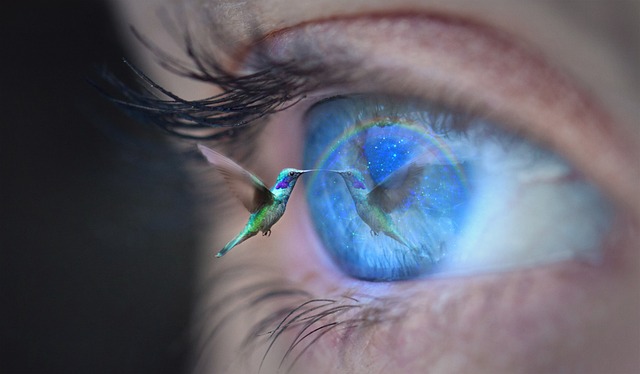How many times do you blink a day? An average person blinks between 14,400 and 19,200 times per day.
Your eyes’ well-being depends on blinking. Additionally to clearing out debris, it keeps your eyes moist and oxygenated.
Although not everyone blinks at the same rate, there is an average rate for how many times the majority of people blink in a minute, hour, or day.
Let’s look more closely at how often you typically blink each day and what might cause that frequency to change.
Table of Contents
How Many Times Do You Blink Per Day?
Similar to breathing, blinking is a daily activity that is performed automatically without thought or counting. So how many times do you blink in a day? Teenagers and adults blink 15 times per minute on average. There are 1,440 minutes in a day, so you probably blink about 21,600 times each day.
Although it may vary from person to person, the average daily blink rate is roughly the same for both sexes. Baby and young child blinks less frequently.
Assuming your blinking frequency is in line with the average for teens and adults, your number of blinks in a given timeframe should resemble the following:
- How many times do you blink each week? Around 151,200 times per week
- In a month, how often do you blink? Around 657,439 times per month
- How many times do you blink each year? roughly 7.8 million times annually.
- How many times do you blink in a decade? Over 78.8 million times a decade, you blink.
- How many times do you blink throughout your life? Over the course of your life, you will blink more than 621.5 million times.
Why Do You Blink Your Eyes?
Your eyes’ health is maintained by blinking for many reasons. You blink to keep your eyes clean and moisturized as well as to give your eyes and mind a break.
In fact, these are the four primary functions of blinking:
- Blinking keeps your eyes clean – Blinking helps to wash away allergens like pollen, dust, and other debris by moving the eyelid and dispersing tears. Infection and irritated eyes are less likely as a result.
- Blinking keeps your eyes moist – The tear film, a layer of tears that covers the surface of your eye, is refilled by blinking. For healthy eyes and clear vision, the tear film is crucial.
- Blinking gives your eyes a rest – Your eyes can briefly pause from the current task by blinking, then they can quickly refocus. Eye fatigue can be avoided with regular blinking.
- Blinking gives your mind a break – Additionally, blinking gives you brief mental pauses that can help you refocus when you’re concentrating on a task.
As you can see, maintaining eye health depends on blinking. Even though you hardly ever notice you’re doing it, it actually plays a crucial role in your day.
How often do you blink each day?
About 15 to 20 times per minute on average, most people blink. That means, while you’re awake, you probably blink:
- 900 – 1,200 times an hour
- 14,400 – 19,200 times a day
- 100,800 – 134,400 times a week
- between 5.2 and 7.1 million times a year
A blink lasts for 0.1 to 0.4 seconds. This accounts for roughly 10% of the time you are awake based on the average person’s blink rate of once per minute.
According to research, neither your sex nor your age significantly affects how frequently you blink.

What Can Happen If You Don’t Blink?
If you don’t blink, or don’t blink frequently enough:
- Since your cornea lacks blood vessels, it may swell. Your cornea also needs oxygen, which your blinking provides by way of the tear film. Your cornea should continue to receive the oxygen it requires even if you simply blink less frequently. But if you don’t blink, your cornea could swell from a lack of oxygen. In fact, while you sleep, your cornea swells a little bit before quickly returning to normal.
- The nutrients required for healthy eyes will not be given to your eyes.
- Because your tear film isn’t being renewed, your eyes may become dry. Vision blurring and eye pain may result from this.
- Debris that stays in your eye and a lack of oxygen to the eye both increase your risk of developing an eye infection.
What Can Cause You to Blink Less Often?
Computer vision syndrome is a common cause of decreased blinking. Using a computer nonstop for an extended period of time can cause this.
In fact, studies have found that using a computer causes you to blink 66 percent less. It’s possible that using a computer causes you to blink less frequently, which could explain why you experience dry eyes.
To help combat computer vision syndrome, try:
- taking frequent breaks and use the 20-20-20 rule: every 20 minutes, look away from your computer and rest your eyes on something 20 feet away for 20 seconds
- reminding yourself to blink while you’re in front of your computer
- using eye drops
- adjusting your lighting or screen position to reduce glare, or use a glare filter on your screen
- adjusting the brightness and contrast of your screen so you don’t have to strain your eyes to read
- limiting how much time you spend in front of a computer screen, especially closer to bedtime when lighting may be worse and you’re more fatigued
If your eyelid is bothering you, you might also blink less frequently. Eyelid issues may be caused by:
- paralysis
- injury
- eye disease
- side effects of surgery
Due to problems with their muscle movements, some people with Parkinson’s disease may also blink less frequently.
What Can Cause You to Blink More Frequently?
Even though blinking more often can be annoying, it’s rarely a sign of a serious problem.
Some possible causes of more frequent blinking include:
- eye irritation, due to irritants in the air, dry eyes, a scratch on your cornea, inflammation of your eyelid or iris, having something in your eye, or other reasons
- eye strainfrom focusing on one thing for too long — for instance, after you shut down your computer at the end of the day
- vision problems, like nearsightedness, farsightedness, or your eyes not aligningproperly
- a movement disorder, which can cause eye spasms
- anxietyor stress
- fatigue
- habit
Rarely, a more serious condition may indicate itself by a frequent blinking pattern. Conditions that may cause frequent blinking include:
- seizure disorders(especially in children)
- multiple sclerosis
- Wilson’s disease
- Tourette syndrome
Read about Why Does My Eye Hurt When I Blink
Symptoms to Watch Out For
The majority of the time, a change in blinking frequency is not caused for alarm. However, if frequent blinking is present along with other symptoms, it may indicate a more serious condition.
Be sure to look out for:
- signs of an eye infection:
- redness
- watering
- itching
- burning
- pain
- sensitivity to light
- discharge
- swelling
- feeling like there’s something in your eye
- blurry vision
- blinking frequency changes after a recent eye injury
- problems with your balanceor coordination
- other muscle spasms
- physical and vocal tics(in children)
Should You Blink More Often?
Most people spend at least some of each day in front of a screen, be it a laptop, a smartphone, or a television. You’re not blinking as frequently as you should be, which is probably the case. Your eyes can stay healthy if you make an effort to take a break from what you’re doing and blink.
While staring at a screen, you can schedule brief breaks to keep your eyes from drying out. If you find yourself staring at a screen for longer than 20 minutes, take a break and blink once every 20 minutes. You can use a timer for this.
Take a 10-second break from the screen by slowly closing and opening your eyes. Make sure you do “full blinks” by closing your eyes and pausing in order to fully distribute the tears over your eyes.
The Bottom Line
Most people blink 15 to 20 times per minute on average. By supplying them with oxygen, moisture, and the removal of debris, this keeps your eyes healthy.
Even though there are some conditions that can make you blink more or less often, a change in your blinking rate is rarely an indication of a serious problem.
Speak to your doctor if you notice changes in your blinking patterns along with indications of an eye infection, neurological symptoms, or a recent eye injury. In this instance, it might be a precursor to something more serious.





